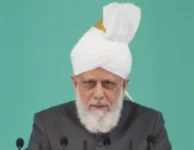In his weekly talk, Hazrat Mirza Masroor Ahmad shared stories from early Muslim times. He focused on events that took place when Muslims went out with the Prophet Muhammad.
He started with a tale about Abu Qatadah during a trip to Dhi Qarad. The Prophet had sent some men ahead, then came with more helpers. When they arrived, their foes ran away. They found Abu Qatadah's horse hurt. The Prophet stood by it and said kind words. People thought Abu Qatadah had died, but he came back later with his camels. The Prophet then said many prayers for him.
An arrow had hit Abu Qatadah. The Prophet helped take it out and put his blessed touch on the wound. Abu Qatadah said it felt like he never had a wound at all.
Another man, Salamah, fought hard at Dhi Qarad. He chased the enemy alone, far from his friends. He caught two men and brought them to the Prophet. The Prophet set up camp near where these men were caught. When Salamah asked to hunt down more foes with 100 men, the Prophet smiled and told him to be kind if he found them.
On their way home, Salamah and another man started a race. The Prophet let them run. Salamah held back for a bit, then ran fast and won. This trip kept them away from home for five days.
The talk turned to Abu Dharr's wife, who had been tied up but broke free. She rode away on the Prophet's camel, which enemies had taken before. She promised God she would give up the camel if she made it home safe. But when she reached home, the Prophet said she should not harm the camel, as it did not belong to her.
The leader then spoke about a group led by Aban bin Sa'id in early year seven. Aban came from an important family and joined Islam between two big events. The Prophet sent him to keep their home safe when he went to battle.
The speech ended with news about three people who had passed away: Muhammad Ashraf, who loved his faith deeply; Habib Muhammad Shakry, a wise leader from Kenya; and Anubi Madingo, who built the first prayer house of his group in Zimbabwe. The leader asked God to bless them all.
He started with a tale about Abu Qatadah during a trip to Dhi Qarad. The Prophet had sent some men ahead, then came with more helpers. When they arrived, their foes ran away. They found Abu Qatadah's horse hurt. The Prophet stood by it and said kind words. People thought Abu Qatadah had died, but he came back later with his camels. The Prophet then said many prayers for him.
An arrow had hit Abu Qatadah. The Prophet helped take it out and put his blessed touch on the wound. Abu Qatadah said it felt like he never had a wound at all.
Another man, Salamah, fought hard at Dhi Qarad. He chased the enemy alone, far from his friends. He caught two men and brought them to the Prophet. The Prophet set up camp near where these men were caught. When Salamah asked to hunt down more foes with 100 men, the Prophet smiled and told him to be kind if he found them.
On their way home, Salamah and another man started a race. The Prophet let them run. Salamah held back for a bit, then ran fast and won. This trip kept them away from home for five days.
The talk turned to Abu Dharr's wife, who had been tied up but broke free. She rode away on the Prophet's camel, which enemies had taken before. She promised God she would give up the camel if she made it home safe. But when she reached home, the Prophet said she should not harm the camel, as it did not belong to her.
The leader then spoke about a group led by Aban bin Sa'id in early year seven. Aban came from an important family and joined Islam between two big events. The Prophet sent him to keep their home safe when he went to battle.
The speech ended with news about three people who had passed away: Muhammad Ashraf, who loved his faith deeply; Habib Muhammad Shakry, a wise leader from Kenya; and Anubi Madingo, who built the first prayer house of his group in Zimbabwe. The leader asked God to bless them all.












